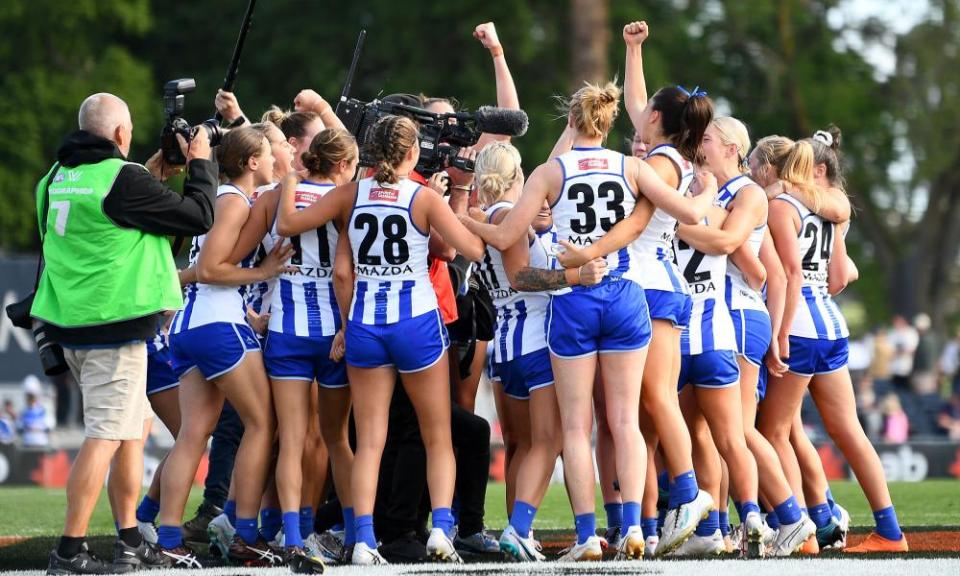Patience, belief and fierce midfielders key to Kangaroos’ AFLW finals push

Against the three most recent AFLW premiers in Brisbane, Adelaide and Melbourne, North Melbourne had won just twice in 16 attempts. Worse still, they had only beaten Melbourne once in nine match-ups. Going into their qualifying final against the Demons, they had an exceptional record of 37 wins from 42 games against 14 teams. But no result is a foregone conclusion, and the most optimistic Kangaroos fans couldn’t have confidently predicted a win.
It was hailed as their greatest victory so far – a 41-point demolition of the Demons to secure a home preliminary final. The evident improvement resulting from a whole-of-team effort that has been building for a long time.
When the Roos joined the competition in the first round of expansion in 2019, their list of players set expectations soaring. They welcomed Collingwood stars Jasmine Garner and Emma King, and Western Bulldogs premiership players Emma Kearney and Jenna Bruton.
Related: From Tipperary to Geelong: Irish players are taking the AFLW by storm | Jack Snape
In their first season, a controversial conference system split the competition in halves, with the top two from each progressing to preliminary finals. The Roos’ record would have placed them third on a conventional ladder, but the imbalance of the conferences meant they missed the finals altogether.
Despite having made for frightening opposition since, North Melbourne haven’t been able to match the established contenders. They’ve qualified for the finals in every season but have failed to make the grand final.
To look at their inaugural list, it’s striking that the Kangaroos have managed to keep their senior core together as the league has swelled from 10 to 18 clubs. It speaks to the group’s belief in what they can still achieve.
Inaugural captain Kearney is now also embedded in North Melbourne’s senior men’s program as a development coach, giving her constant exposure to top-flight football, and she will have brought plenty back to the team she leads.
Perhaps most prominent in their success, and potential, are midfielders Garner, Bruton and Ash Riddell. An undisputed star, Garner recently clinched her third AFL Coaches Association’s player of the year award. The league’s best and fairest award has eluded her, although that could change at Monday’s W Awards.

As a midfielder, Garner does it all. Her game awareness allows her to find space to clear the ball with ease, delivering it by hand to teammates, booming it forward or getting the job done herself. Many teams have tried a hard tag on her, with varying results. One of the most memorable came from Richmond’s Meg Macdonald in round 10 last season. She held Garner to five disposals and no clearances in the first half, the match ended in a draw and resulted in the Roos narrowly missing the top four.
But to focus on Garner is to open your team up to other problems. Two-time All-Australian Riddell has averaged over 30 disposals this season, often teaming up with Garner to duck and weave, bringing speed and agility to the midfield. Then there’s Mia King, who doesn’t mind getting her hands dirty in the contest, averaging a career-best of more than nine tackles a game this year.
Related: Geelong get it done early to pass toughest AFLW assignment yet | Danielle Croci
Despite their growing depth, the Kangaroos’ breakthrough win against the Demons two weeks ago was built on the buy-in of every player. Almost every time a Melbourne player gained possession, the Kangaroos would swarm to ensure the opposition couldn’t deploy their handball game. They laid the equal second-most tackles (104) on record. Forward Tahlia Randall, who out-muscled her marker in Libby Birch to kick three goals, confirmed they had targeted triple figures. Kearney put their intensity down to the younger players’ extra running and skills sessions over winter.
Down the other end, Sarah Wright and Jasmine Ferguson formed a wall. Despite Melbourne having registered two more inside-50s than North Melbourne for the match, they scored only nine points to North’s 50. This consistent intensity was missing in losses to Adelaide and Brisbane earlier in the season, when twice they led comfortably before being overrun in the final minutes.
A week off will have allowed North Melbourne to recharge, but Adelaide know all about preliminary final pressure, having won four out of the five they’ve played. The Crows have kept their triple-premiership midfield mostly intact, with physicality and precision in Anne Hatchard, who had a record 36 disposals last weekend and two goals, and Ebony Marinoff. A tag on one of them is likely, though the Kangaroos’ game plan will need to allow for adaptation. In last weekend’s semi-final Sydney’s Tania Kennedy focused on Marinoff in the first half and then was put on Hatchard in the last quarter, which was far too late.
The Crows have plenty to play with in terms of selection. Small forward Jess Waterhouse was overlooked for the qualifying final, but bounced back last weekend to score two goals. Continuing this height mix in their forward line could help the Crows take on North Melbourne’s defensive wall.
Last season, much of what is written here could have been said about Melbourne as they went on to win their first premiership. Could North Melbourne climb the same mountain?

 Yahoo Sport
Yahoo Sport 





































